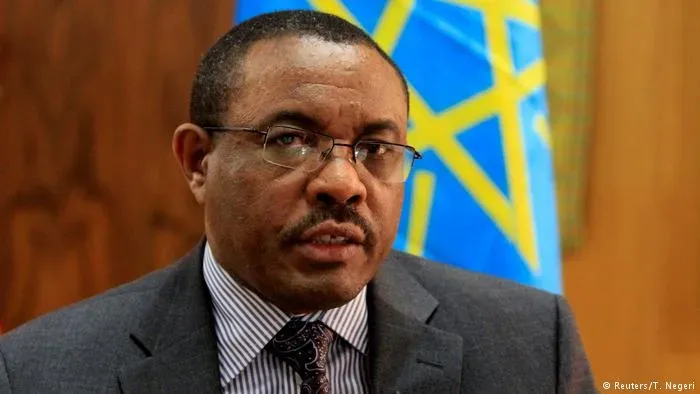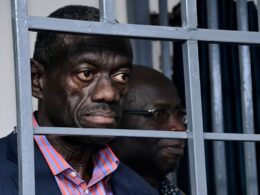Ethiopian Prime Minister, Hailemariam Desalegn, has resigned. His resignation was done via a televised announcement on Thursday amid political turmoil in one of Africa’s fastest-growing economies.
The announcement came just after the government released hundreds of political prisoners, including some of the most prominent opposition members in the country, sparking massive celebrations in the cities and towns around the country.
A staunch U.S. ally in the fight against terrorism and the second-most populous country in Africa, Ethiopia is a regional powerhouse with grand economic ambitions. But for the past few years it has seethed with social unrest that has killed hundreds, and thousands have been imprisoned, including top opposition figures.
Desalegn’s resignation also comes just hours after another African powerhouse, South Africa, saw its president resign also amid political turmoil
According to the state Ethiopian News Agency, Desalegn resigned both as prime minister and chair of the ruling party “to be part of the efforts to provide a lasting solution to the current situation.” He added he would stay on until a successor was chosen.
In his speech, Desalegn noted that people had been displaced and injured and property damaged in the recent unrest and that he believed his resignation was necessary to carry out the democratic reforms that were underway.
Earlier in the week, there were widespread demonstrations by the Oromo — the country’s largest ethnic group, representing more than a third of Ethiopia’s 100 million people — over the perceived slow pace of prisoner releases promised in January.
Young men blocked roads leading out of the capital with rocks and burned tires, disrupting public transportation networks. Businesses throughout the vast Oromo region were shuttered as part of a strike.
The strike was lifted on Wednesday with the prisoner releases. Opposition figures in Ethiopia’s extensive diaspora claimed the government had capitulated in the face of popular pressure.
For Mohammed Ademo, an analyst of Ethiopian affairs running the website Opride.com, which is often critical of the government, the move came now because the ruling party wants a more assertive person in charge during a time of crisis.
“His resignation at this point in time is rather extraordinary and surprising. I think from the party perspective, it is clear he has no power and lost control of the streets,” he said. “We should be very clear, this change, the prisoner release and the fact that the party is trying to make amends and reform is the result of years of relentless opposition and protest.”
He warned that choosing a hard line figure from the old guard to be the new prime minister rather than someone from the new rising group of politicians in the ruling party with greater public support would result in more opposition.
There were also rumors swirling on social media that there would be a new state of emergency until another prime minister was selected.
Just two days before the resignation, U.S. Ambassador Michael Raynor expressed a degree of concern over the unrest in the country and urged political opening and peaceful dialogue.
“People need to be free to express themselves peacefully, and to be confident that they can do so,” he wrote on the embassy’s Facebook page. “Lethal force to protect the safety of the public, even in the face of violent protests, must always be a last resort. At the same time, people need to demonstrate their commitment to peaceful expression and dialogue.”
Desalegn became prime minister in 2012, succeeding Meles Zenawi, the architect of Ethiopia’s recent economic boom. The country saw a decade of double-digit growth, based largely on state investment in infrastructure. Growth has slowed in recent years amid severe droughts and social unrest.
Though Ethiopia is ostensibly a democracy, its ruling coalition controls 100 percent of the parliament, and critics say the nation is dominated by the northern Tigrayan minority, which makes up 6 percent of the population.
Desalegn, who comes from the south, was seen as a caretaker and consensus figure without a great deal of power himself, implementing the orders of more powerful figures in the army and party. It was widely rumored he would be resigning after the party congress scheduled for next month.
The Oromo have been protesting for increased rights and against their perceived economic marginalization since the end of 2015, and at one point the government declared a 10-month state of emergency in October 2016 to restore calm.
Fighting also broke out last year between Oromos and the country’s ethnic Somali people, killing hundreds and displacing a million peopl e, according to the International Organization for Migration. Despite repeated government assurances that the strife is under control, reports still surface of continued fighting.
The ruling Ethiopia People’s Revolutionary Democratic Front, of which Desalegn was once chairman, has also faced internal divisions as the parties representing the other ethnic regions, particularly the Oromo and the Amhara, jockey for position. The Amharas are the nation’s second-largest ethnic group.
The question now for everyone in the country is who will be the new prime minister and whether that person will continue to pursue a rapprochement with the disaffected segments of society or initiate a new crackdown.
“It is a crucial moment — who is going to take his place and what difference he or she will bring about?” said Befeqadu Hailu, a member of the Zone 9 blogging collective who was imprisoned by the government. “He couldn’t manage the public grievances.”










Join our Channel...